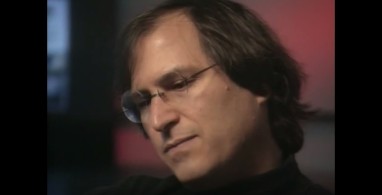In Praise of (Slow) Taste
Posted: October 8, 2015 Filed under: Creative, Food and Drink | Tags: culture, design, nutrition, Ratatouille, Soylent, Steve Jobs, Triumph of the Nerds Leave a comment
Steve Jobs once famously said (in the documentary The Triumph of the Nerds: The Rise of Accidental Empires, PBS, June 1996) of Microsoft (and by implication Bill Gates) that while he thought “they earned their success, for the most part,” that the problem with Microsoft “is that just they don’t have taste” and that “they don’t bring much culture into their product.” He said some other things in that interview that I think are hypocritical or laughable (such as his assertion that Microsoft doesn’t “think of original ideas” when he himself lauded the great artists who “steal shamelessly”) yet his main dig at Microsoft has remained potent after almost 20 years and was, in this correspondent’s opinion, largely true. And it was as an artist, a designer, as a creative person that I think Jobs most thought of himself and that many if not most others in his industry were not artists or artistic but instead engineers.
Now without brilliant engineering, Apple (nor the rest of Silicon Valley) would never have existed — the Apple II was a marvel of engineering as well as devices such as the iPod, which never would have existed without things like highly reliable and small hard drives. But Jobs’ assertion, that bringing the arts into technology is an important one and I was reminded of it when I read about a startup called Soylent.
Soylent is making products that provide in powder or pre-mixed liquid formats, a convenient way to consume calories in a nutritious and efficient manner. Wrote The Economist in its coverage of the product

“One should eat to live, not live to eat,” wrote Molière, the French comedic playwright. Some workaholic entrepreneurs have taken him at his word. Soylent, a two-year-old startup, is trying to save consumers time and money by selling them a healthy, cheap “meal” that they can drink. Each vegetarian portion has only around 400 calories, costs around $3 and boasts of being as nutritious as, and more environmentally-friendly than, processed food and meat.
Soylent has found a place among American workaholics who resent the cost and hassle of preparing regular meals. This is especially true in Silicon Valley, home of many “early-adopter” engineers too consumed with coding the future to break from work. Their bad diets can damage their health.
Soylent claims to have many pluses and advantages such as the fact that it is “engineered to deliver all essential nutrients and provide an even release of energy” and that it is friendly to those on vegan diets and it is lactose-free. Providing a healthier option to grabbing a chocolate bar for dinner or consuming endless packs of instant ramen noodles from the convenience mart is probably a good thing.

Yet the engineering, efficiency-focused nature of the product and its pitch reminded me of Jobs’ quote because while there is a sort of engineering-scientific logic to consuming a product like Soylent, it misses, in my opinion, one of the basic cultural aspects of food and meals, which is that many people do not think like Molière and that sharing a meal with others, however humble or brief, is in itself a good. This failure to truly grasp or relate to this aspect of human needs is important because many areas of social and economic life are now shaped by the tools and technologies of Silicon Valley entrepreneurs such as Soylent’s Rob Rhinehart, its creator, who considers shopping at grocery stores, in the presence of “rotting” produce, a “multisensory living nightmare”, and no longer owns a fridge (The Economist).
Ultimately the marketplace will sort-out whether this product will fly and they have raised some significant sums from investors:
in January the firm raised $20m from investors, including Andreessen Horowitz, a well-regarded venture-capital firm. But it has plenty of obstacles to overcome. Yucky-sounding ingredients like algal oil (yes, derived from algae) will put many off, as well as reviews from early users that Soylent makes them gassy. “I prefer my food with both flavour and texture,” says one young, vegetarian entrepreneur who has tried it. Mr Rhinehart insists that Soylent’s “neutral” taste is the best way to appeal to the broadest group of people. Just how big that group really is, however, remains to be seen.
The point of this post is not so much that efficiency and engineering optimization is a negative, but rather to make the contention that in some areas of life, such as food and meals, so-called “slow food” may well be better, holistically, than “fast food” if we consider not just the consuming of calories but the benefits, such as they may be, from the time spent either interacting with others during a meal or, if eating by oneself, disconnecting however briefly from our lives gazing at screens. It is also possible that what people need from food and meals is not just physical sustenance but the emotions and feelings associated with certain foods and with enjoying food with others. This is hard to put into a regression equation but should not be lost in the scramble for “efficiency” and for the “optimization of time utilization”.
I’ll leave you with this great sequence from “Ratatouille.”














